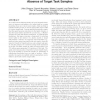Free Online Productivity Tools
i2Speak
i2Symbol
i2OCR
iTex2Img
iWeb2Print
iWeb2Shot
i2Type
iPdf2Split
iPdf2Merge
i2Bopomofo
i2Arabic
i2Style
i2Image
i2PDF
iLatex2Rtf
Sci2ools
ATAL
2015
Springer
2015
Springer
Learning Inter-Task Transferability in the Absence of Target Task Samples
In a reinforcement learning setting, the goal of transfer learning is to improve performance on a target task by re-using knowledge from one or more source tasks. A key problem in transfer learning is how to choose appropriate source tasks for a given target task. Current approaches typically require that the agent has some experience in the target domain, or that the target task is specified by a model (e.g., a Markov Decision Process) with known parameters. To address these limitations, this paper proposes a framework for selecting source tasks in the absence of a known model or target task samples. Instead, our approach uses meta-data (e.g., attribute-value pairs) associated with each task to learn the expected benefit of transfer given a source-target task pair. To test the method, we conducted a large-scale experiment in the Ms. Pac-Man domain in which an agent played over 170 million games spanning 192 variations of the task. The agent used vast amounts of experience about tra...
| Added | 16 Apr 2016 |
| Updated | 16 Apr 2016 |
| Type | Journal |
| Year | 2015 |
| Where | ATAL |
| Authors | Jivko Sinapov, Sanmit Narvekar, Matteo Leonetti, Peter Stone |
Comments (0)

